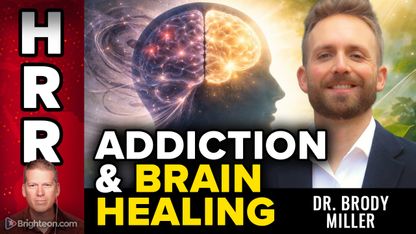
"Just stop giving them the vaccine. People are dying," Yeadon said in the Delingpod podcast with James Delingpole.
He cited the recent cases of blood clots in the brain associated with the AstraZeneca COVID-19 vaccine in Germany where the victims were mostly women under the age of 60. "Those are women who would not have died of the virus. They're being killed by the vaccine," said Yeadon, who has an extensive experience as allergy and respiratory researcher.
Germany had since suspended the use of AstraZeneca COVID-19 vaccine for people aged below 60 because of the risk of rare blood clots.
Yeadon slams AstraZeneca's COVID vaccine trial in children
Yeadon also questioned the clinical trials of COVID-19 vaccines in children, noting that there had been zero deaths among previously healthy children who acquired the disease. He specifically slammed the AstraZeneca COVID-19 vaccine trial in 300 children.
"It's an awful, awful behavior. We're exposing 300 children to get results that will be used for public relations purposes to coerce you to bring your children (for vaccination)," Yeadon said.
University of Oxford, which developed the vaccine with AstraZeneca, said that it had suspended that trial of the vaccine in children and teenagers in Britain while it waits for regulatory guidance.
According to Yeadon, the results of that trial don't really matter because it is statistically underpowered. Meaning, the test has relatively poor probability of detecting a specific effect.
For example, the test won't detect if the vaccine can lead to the death of one in 1,000 children. Without that data, you will not know that 10,000 in every 10 million children will be at risk of dying after getting the COVID-19 vaccine.
So he urged the parents not to bring their children to vaccination sites if and when a COVID-19 vaccine for children gets authorized. (Related: Moderna to start testing its mRNA COVID-19 vaccine on children – are parents really letting their kids serve as guinea pigs?)
"Why would you want to take the risk of a new technology vaccine which is a few months old and give it to millions of children? The answer cannot be to save them from coronavirus," Yeadon said.
Vaccination drives lead to creation of vaccine passports
Yeadon thinks there is a bigger reason why governments insist on vaccinating everyone: vaccine passports.
Those who own or operate the vaccine passport database (i.e., the governments) will have complete control of people. They will determine where people can or can't go depending on their immunization status. They will determine the privileges a person can get.
"They want to have a common platform database with your name, unique ID and immunization status," Yeadon said. "That platform provides the perfect tool for totalitarian control of every living being on the planet."
There is no medical reason behind it, according to Yeadon. Governments simply want more control.
Governments can't say they want to protect the vaccinated people from the non-vaccinated people because the vaccinated ones are supposedly immune to the disease. The only plausible reason they can give is that they want to protect the non-vaccinated from each other.
But even that reasoning is flawed. Having vaccine passports promotes division in society. It's like segregating the vaccinated from the non-vaccinated population. So instead of protecting non-vaccinated people from each other, the governments actually encourage them to converge and live a life separate from the vaccinated population.
Of course, governments don't want that scenario. They prefer to control everyone. They want to create a world where they can monitor every action and predict every outcome.
That's why they're trying to get everyone vaccinated. "They want something that has nothing to do with protecting you from this virus," Yeadon said. (Related: South Koreans without vaccine passports will not be able to go to work and enter stores.)
It's illegal in most countries to coerce people to get vaccinated
He also pointed out in the podcast that people should know it is illegal in most countries to force their constituents to get vaccinated because of treaties.
It resulted from the post-World War II court trials of Nazi doctors who experimented on humans without consent. As part of their judgment, the war crimes tribunal established 10 principles to guide physicians in all human experimentation.
First on the list is the fact that voluntary consent is absolutely essential. Meaning, no one can coerce you to get vaccinated.
The set of principles known as the Nuremberg Code is applicable in the ongoing vaccination drives around the world because, according to Yeadon, "these vaccines haven't been around long" and that "no one can tell you what would happen" after getting vaccinated.
The first in the set of principles has also put into question the COVID-19 vaccine trials for children as it explicitly states that the person involved should have the legal capacity to give consent. Obviously, children have no such capacity.
Watch the Delingpole podcast featuring Yeadon here.
Other experts have raised doubts about vaccines and vaccination drives
Many other respected individuals have expressed controversial views about COVID-19.
Michael Levitt, a winner of the Nobel Prize for chemistry, told the Stanford Daily last summer that he expected the pandemic would end in the U.S. in 2020 and kill no more than 175,000 Americans and that "when we come to look back, we're going to say that wasn't such a terrible disease."
Luc Montagnier, another Nobel Prize winner, said last year that he believed the coronavirus was created in a Chinese lab. Many experts doubt that, but so far there is no way to prove or disprove it.
In a debate last fall in Britain's House of Commons about the government's response to the pandemic, parliamentarian Richard Drax called Yeadon an "eminent" scientist, and cited his view "that the virus is both manageable and nearing its end."
David Kurten, a member of the London Assembly, tweeted there is a "real danger" that COVID-19 vaccines could leave women infertile. "The 'cure' must not be worse than the 'disease,'" Kurten wrote.
Just recently, vaccine expert Dr. Geert Vanden Bossche urged governments to stop vaccination drives. He said in an open letter that vaccinations will fuel the spread of new "dangerous variants" of the virus.
Follow Immunization.news for more news and information related to coronavirus vaccines.
Sources include:
Please contact us for more information.






















